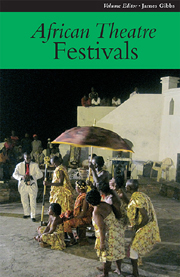Book contents
- Frontmatter
- Contents
- Notes on Contributors
- Obituary of Efo Kodjo Mawugbe
- Introduction by James Gibbs
- Festivals as a Strategy for the Development of Theatre in Zimbabwe 1980–2010
- The Legacy of Festac '77
- Festac, Month by Month & Soyinka's Involvement
- The Dakar Festivals of 1966 & 2010
- African Renaissance between Rhetoric 30 & the Aesthetics of Extravagance FESMAN 2010 – Entrapped in Textuality
- Theatre Programme for FESMAN & Commentary
- The Pan-African Historical Theatre Festival (PANAFEST) in Ghana, 1992–2010
- PANAFEST through the Headlines
- International Festivals & Transnational Theatre Circuits in Egypt, 1988–2010
- The Jos Theatre Festival 2004–2011
- The Grahamstown Festival & the Making of a Dramatist An interview with ANDREW BUCKLAND
- Playscript
- Book Reviews
The Legacy of Festac '77
The challenge of the Nigerian National Theatre at Iganmu
Published online by Cambridge University Press: 05 May 2013
- Frontmatter
- Contents
- Notes on Contributors
- Obituary of Efo Kodjo Mawugbe
- Introduction by James Gibbs
- Festivals as a Strategy for the Development of Theatre in Zimbabwe 1980–2010
- The Legacy of Festac '77
- Festac, Month by Month & Soyinka's Involvement
- The Dakar Festivals of 1966 & 2010
- African Renaissance between Rhetoric 30 & the Aesthetics of Extravagance FESMAN 2010 – Entrapped in Textuality
- Theatre Programme for FESMAN & Commentary
- The Pan-African Historical Theatre Festival (PANAFEST) in Ghana, 1992–2010
- PANAFEST through the Headlines
- International Festivals & Transnational Theatre Circuits in Egypt, 1988–2010
- The Jos Theatre Festival 2004–2011
- The Grahamstown Festival & the Making of a Dramatist An interview with ANDREW BUCKLAND
- Playscript
- Book Reviews
Summary
‘Nothing is more appropriate at this time in Black and African history than a re-discovery of those cultural and spiritual ties which bind together all Black and African peoples of the world over.’ (Lt-General Olusegun Obasanjo, Head of State of Nigeria and Patron, ‘Festac ‘77)
‘This is indeed a moment when Black and African Peoples must intensify their efforts to posit their true identity in the contemporary world. This Festival represents an effort on our collective part to come together as a people so as to set in motion a new cultural awakening and cultural awareness in the Black and African world.’ (Commander O.P. Fingesi, President of the International Festival Committee)
‘My conclusion therefore, is as follows: if we wish the Second World Black and African Festival of Arts and Culture to be a success, as I do, we should consider its colloquium as the most important point which should define and illustrate black civilization and above all its spirit; that is, its culture, which is today the most powerful force in the universal civilization.’ (H.E. President Leopold S. Senghor, President of Senegal)
The three statements quoted above were used to justify the organisation and the celebration of African culture and civilisation in a festival held in Nigeria during January/February 1977.
- Type
- Chapter
- Information
- African Theatre 11: Festivals , pp. 14 - 21Publisher: Boydell & BrewerPrint publication year: 2012



